The car won’t start when the engine is hot? If so, you have to consider this is a significant issue in your car that needs to be fixed as soon as possible; otherwise, a warm engine can ruin your car.
Evidently, the engine is the most essential and also the most expensive component of a car, which is why nobody wants the engine overheating problem to exist in their car.
By noticing some of the components in your car, you can tell why your car is hard to start when warm. Again, to keep your car in good condition, you must avoid hot engine issues.
To know the causes of hard starting when the engine is hot, you need to follow this in-depth article, where you also find how to fix a car that won’t start when the engine is hot too.
What Causes Car Won’t Start When Engine Is Hot
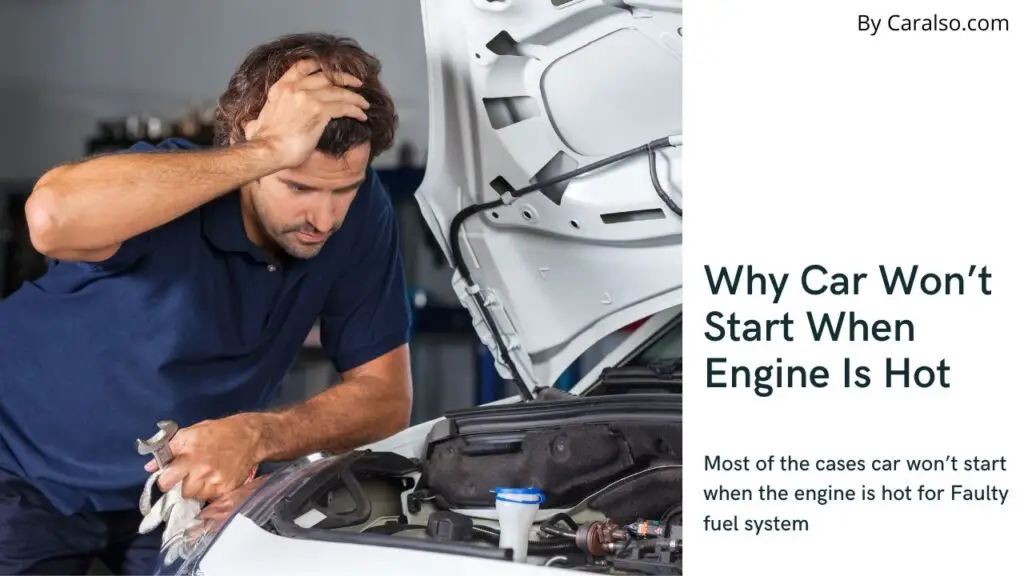
In most cases, the faulty fuel system and bad crankshaft or camshaft position sensor are the common causes why a car won’t start when the engine is hot. Also, cars do not start when the engine is hot because of other causes, including clogged air filters and bad car battery connections.
Common causes of hard starting when the engine is hot:
- Faulty Fuel System
- An Issue With the Car Battery Terminal or Cable
- Failing Camshaft or Crankshaft Position Sensor
- Engine Ground Connection Problem
- Clogged Air Filter
- Wrong Engine Oil
- Starter Motor And Circuit Issue
- Vapor Lock
- Lack of Engine Coolant
1. Faulty Fuel System

A faulty fuel system is the most common cause of a car won’t start when the engine is hot because a bad fuel system is not able to let the fuel into the combustion chamber.
When your car engine is going too hot, the engine provides a hit, and a certain vapor can be the main obstacle while it is working, making the fuel system so hard to circulate.
If the fuel cannot circulate well, the car engine cannot work effectively, and eventually, lead the car engine to overheat.
If the fuel lines are too hot for the car engine heat or weather conditions, the fuel will get the room to evaporate into the fuel line, which makes the engine hard to start.
A fuel pressure regulator or fuel injector can also be the reason why your car is hard to start when the engine is hot. Not only this also for the fuel pressure damper in your car can cause car starting issues. In the fuel system, there is a fuel line.
If anything goes wrong with the fuel system, your car can also be disabled anytime and anywhere, a situation that nobody wants.
But nowadays car manufacturers almost solve this issue in cars. Most cars now have a fitted fuel injector. The fuel is kept at high pressure in the fuel injector, so your car will not have to deal with vapor, Which means your car fuel can be circulated efficiently no matter if the engine is hot or cold.
Symptoms of a bad fuel injector:
- Engine misfire and down power.
- Often rough idling.
- Black smoke from the exhaust.
- Fuel is lacking in cars.
- Car stalling.
Related: Way to Clean Engine Bay Without Water
2. Issue With the Car Battery Terminal or Cable

Whenever it comes to the car’s starting issues, you should check the car battery properly. Not just your battery health; you have to check the battery terminal or cable.
As you know, the starter starts the car. And the car’s starter is powered by the battery, which means the starter gets electricity from the battery to start the engine.
With that said, the battery needs to operate properly to provide electricity to the starter to start the engine. But faulty and corroded battery terminals won’t let the electricity pass to the starter, which is why your car struggles to start when the engine is hot.
A little bit of corrosion may not prevent the car from starting, But this little bit of corrosion will spread all over the car battery real quick—corrosion in the car’s electrical system, which also can make your car not start.
Corrosion hides in the connectors, and this is hard to remove or clean the corrosion from connectors. Keeping the battery terminal corroded-free and avoiding loose battery cable connection is crucial.
Signs of bad or corroded battery terminal:
- Loss of electrical power.
- Hard to start the car.
- The vehicle is not starting.
- Defective Starter motor
The battery terminal or cable is not that expensive like other components in the vehicle, but the battery cable or terminal has a very important role in your car. So, replace the battery cables if they make the car hard to start.
3. Failing Camshaft or Crankshaft Position Sensor
The camshaft and crankshaft position sensor of a car is connected to the car computer, which is also known as ECU or ECM.
Both position sensors are responsible for providing the data of the piston that is necessary to operate the fuel injector and spark plug at an optimal level. But, the car engine gets warm when the camshaft or crankshaft miscommunication with the car’s engine control unit.
Malfunctioning camshaft and crankshaft position sensors disrupt the operation of the fuel injector; therefore, for the lack of fuel, the engine overheats and makes your car hard to start.
Symptoms of bad camshaft or crankshaft position sensor:
- Excessive engine vibration.
- The car engine misfires.
- Your car will struggle to start.
- Check the engine light.
See Also: How To Test ECU With Multimeter
4. Engine Ground Connection Problem
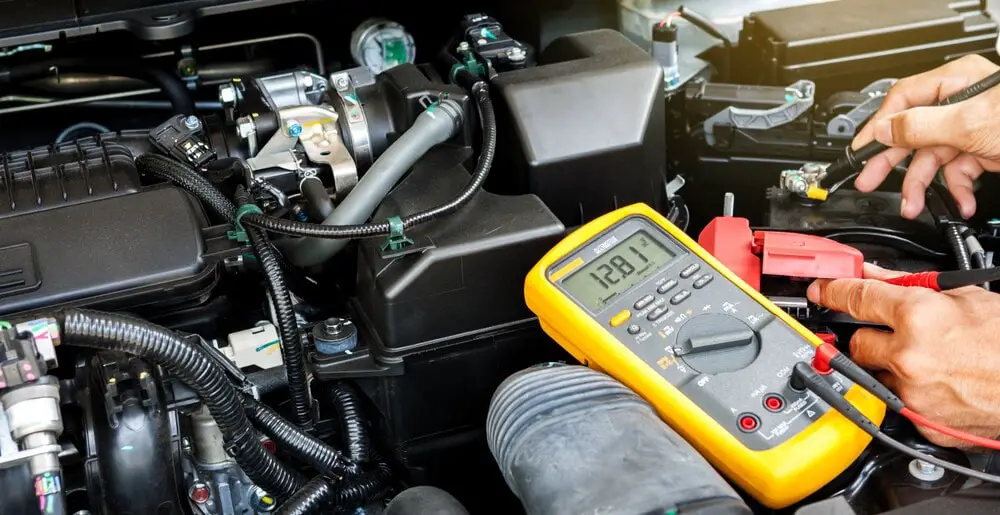
A good ground connection is necessary to keep your car engine running optimally. Like I said before, Corrosion or a loose connection is always bad for every component of your vehicle. Especially corrosion on electrical connectors can make your car hard to start when warm.
If the engine connection is loose or corroded, the circuit increases resistance, which creates all kinds of electrical issues in your car. Loose or corroded engine ground also affects the car starting.
As we know, high temperatures are not suitable for any component or system in our car. In this case, this is also not applicable. High temperatures affect the engine ground connection and make it worse and defective.
You cannot diagnose a defective or bad engine ground connection just by looking at the ground. So, you need to run the test to find bad engine grounding.
How to tell if your car’s engine ground connection is bad:
- Hard to start the vehicle.
- Bad engine ground increases the voltage around the sensor and actuators.
- Dim lights.
- Faulty fuel pump.
- Transmission problem in the car.
5. Clogged Air Filter
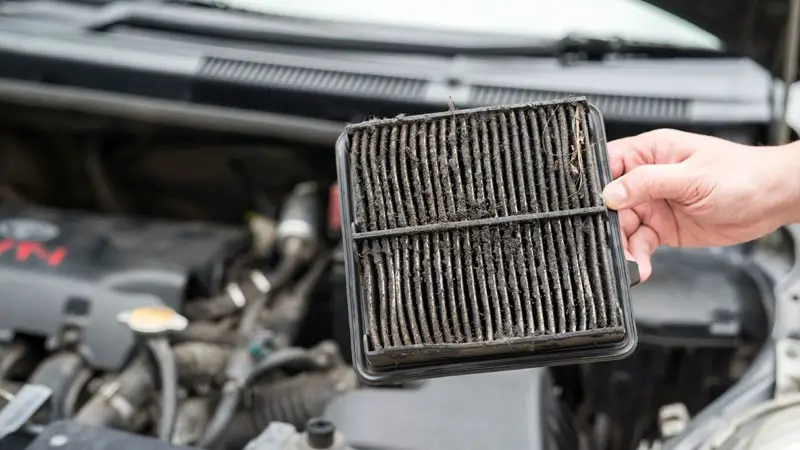
Whether you have a gasoline engine or a diesel engine, an air filter is your car’s most important component. The air filter prevents any dust, particles, sand, and debris from reaching the engine and the air filter ensures a great mixture of air.
Air filters have to produce air for the engine and keep it cool. Your car gets hot if the air filter is clogged or blocked. And, it’s obvious when a car engine is overheated, the car does not start.
If you are using an air filter for a long time, dust, particles, and debris can block airflow through the filter. That’s why you should check and clean the air filter if your car doesn’t start when the engine is hot.
Symptoms of clogged air filter:
- Decreasing the gas mileage.
- The car engine is making a noise.
- Cars are hard to start.
- Strong fuel smell.
- Poor acceleration.
6. Wrong Engine Oil

Wrong engine oil in the car is unusual, but this might also be the reason why your car won’t start. Oil propels the vehicles and builds heat to run.
Motor oil lubricates the moving components of the engine. The oil helps to lubricate the different engine parts to move each other without generating too much friction. Vehicles using conventional motor oil.
Conventional motor oil cannot sustain at a high temperature. That’s why the car won’t start when it’s hot. The wrong oil won’t be able to run your engine smoothly; hence, engines get hot, and cars become too hard to start.
If you don’t know which motor oil your vehicle needs, you should go to a professional mechanic to be sure. And avoid putting the wrong oil into your engine.
7. Starter Motor And Circuit Issue

When you start the motor or press the start button in your car, the battery voltage goes through the starter control circuit and activates the starter solenoid.
The starter motor spins and turns over the engine crankshaft allowing the engine to start.
A starting motor allows the current flow to the armature by using brushes and a commutator, and the starter motor keeps the windings spinning inside.
The high temperature of the engine makes this condition more difficult by increasing electrical circuit resistance. And in the end, the car engine won’t start.
Over time the starter motor and circuit connection wear down too. And this circumstance makes your car won’t start until it cools down.
Diagnosing the car’s starter motor and circuit issue is not that easy, like others. When the starter is falling, you are supposed to hear the clicking, grinding, or whirring noises from the engine.
If you notice these technical problems in your car, I highly recommend you check the car starter motor with a professional.
8. Vapor lock
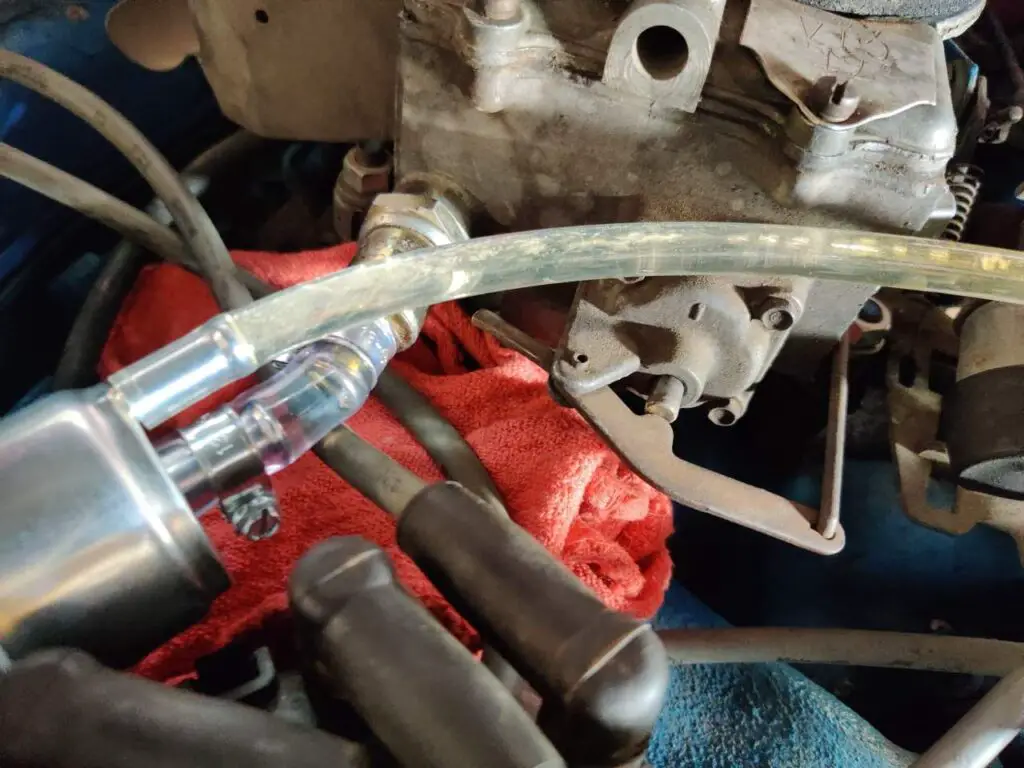
If the engine won’t start when warm but starts when cold, then the vapor lock is a potential cause that you need to consider.
Vapor lock occurs when liquid fuel becomes hot enough to vaporize. When your car fuel boils in the fuel line, the vaporized fuel creates back pressure in the car fuel system, preventing the gas from going into the engine.
If your car vent line is blocked, the vapor will mix with fuel to rush out of the tank, which will cause engine performance issues and make your car struggle to start when hot.
Vapor lock often makes the cars struggle to start in hot weather because the fuel injection system won’t handle boiling fuel.
Symptoms of vapor lock in cars:
- Loss of power (Most common sign)
- No starting
- Loss of fuel pressure
- Engine Stalling
9. Lack of Engine Coolant
Checking the engine coolant level always gets overlooked. But, for lack of engine antifreeze, your car engine can get warm and does not let you start the vehicle.
For those who don’t know, engine antifreeze or coolant is a liquid that is mixed with water to help regulate the car’s engine during extreme temperatures.
If your car runs out of coolant, your car engine will overheat too quickly; hence you should check the level of engine coolant and fill it with coolant when it seems empty.
When you come to an auto repair shop to fix why your car won’t start when the engine is hot, you will notice the machine first checking the coolant in your car because the coolant keeps the engine cool in warm weather.
Symptoms of low coolant in the car:
- Rising temperature gauge.
- Poor fuel economy.
- The car engine is cut-off automatically.
- Car dashboard warning light.
- Faulty heating system.
What To Do If Your Car Won’t Start When Engine Is Hot
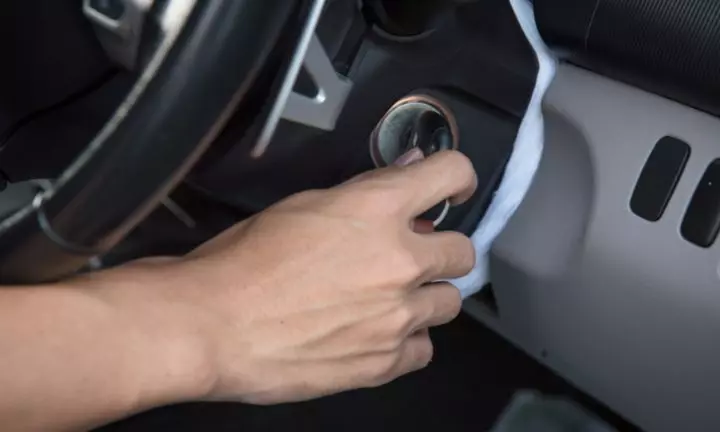
With these causes, it is essential to know what to do if your car won’t start when the engine is hot. So, see how to fix the issue below.
Things that you need to do when your car is hard to start when the engine is hot:
Check Your Car Battery
The car battery empowers the starter motor that starts the engine. Therefore, keeping an eye on battery cable and terminal connections is always important.
When your car is not starting with a hot engine, you should check the battery connections to ensure the electricity passes to the starter motor.
Regular maintenance of the battery will keep the corrosion away from the battery.
Clean The Air Filter
You shouldn’t ignore checking your car’s air filter if your car doesn’t start when hot. Air filters produce air to your car engine and keep it cool and maintained properly.
The air filters can get clogged or blocked. And if your car air filter won’t pass the air as it should to the engine, the engine will get hot and eventually make your car not start.
Refill the Engine Coolant
Engine coolant keeps the engine cool when the engine gets warm and also during hot weather. But, the engine coolant ran out and needed to be refilled after driving around 30,000 miles.
Check the coolant level if your car won’t start when hot. The coolant level should always be full.
Replace Engine Oil
You may notice sometimes car manufacturers recommend different types of engine oil in the summertime because car engines need thicker grade oil than normal during the hot season.
But, before you change the oil, you have to talk to your mechanic and get more knowledge about engine oil and use the right engine oil for your car.
How Much Does It Cost to Fix A Car That Won’t Start?
When it comes to fixing the car starting issues, the labor cost and components price can be higher than you think.
You need to diagnose why your car does not start with a hot engine. And an auto mechanic will charge you around $100 to find out what caused the car to start.
Once the auto machine figures out the component that won’t let the car start, the mechanic also says whether the component needs to be replaced or repaired.
So, the labor cost and the component that needs to be replaced to fix your car won’t start when warm can cost you between $180 to $350.
Can It Be Too Hot To Start A Car?
In short, yes, extreme heat affects your car starting. The extremely hot temperature often causes issues with the fuel and eventually makes the car struggle to start.
So, to start your car without any struggle, it would be very useful to park it in a shaded area during a hot summer.
Also, you have to check your car’s coolant level and ensure the engine coolant is at the optimal level.
Final Thoughts
Now, you know several reasons why a car won’t start when the engine is hot and also what you need to do to bring your car back to the road.
In most cases, the car is hard to start when warm because of a bad starter and lack of engine coolant. Of course, there are several other reasons too, but you should taste both of them first.
As a rule, ensure your car has a sufficient engine coolant level. And also, ensure the starter motor is working as it should be.
Car engine overheating problems should always get the proper and quick attention because if it gets too late, your car engine can be damaged, and you might end up with a costly repair.

Hey there,
How is it going?
I’m Meraj Sarker. I am a Car Mechanic and a student of Automobile Restoration here in Florida, USA. I’ve been studying automotive for around 9 years now. So you can rely on my recommendation. For me, studying and getting knowledge about automobile it’s really fun and entertaining. I will help you to get solutions for your car through this website. If you need any help let me know.

Hey there the truck overheated and then dad cut it off and just started it and the next day it wouldn’t start back it cranks good and everything it just won’t start
Hello Douglas Hunnell, Thanks from Caralso Community.
How you doing today?
When you car cranks good but won’t start it could be because fuel isn’t getting to the engine. So must check fuel system of your truck.
If you have more queries feel free to know me here, Douglas.